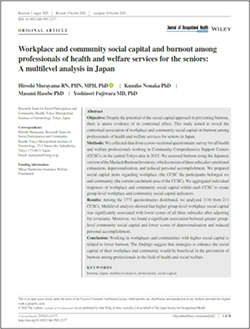#0096 Workplace and community social capital and burnout among professionals of health and welfare services for the seniors: a multilevel analysis of Japan

Can Some Social Interactions Prevent Burnout? A Study On Japanese Health And Social Workers
Burnouts are increasingly common in today’s professional settings, particularly in high-stress occupations like front-line health care and social work. Several strategies have been put in place to minimize this condition, addressing risk factors such as workload, job demands, and workplace support. Recently, novel solutions have started to emerge involving social capital: that is, the resources available within a person’s social network (support, trust, reciprocity, friendliness, among others). Although there is evidence that a large social capital significantly reduces burnout risk, the impact of workplace and “community” social capital (the social setting provided by the workplace community) is less understood.
In a new study, we examined the social settings within Community Comprehensive Support Centers (CCSCs), a health and welfare facility set up for older people in Japan. We conducted 1110 surveys among the CCSC staff members at 211 centers, using questionnaires to collect data on individual workers and their perceptions of social capital in their workplace and their interacting community. The participants’ burnout risk was assessed using the Japanese version of the Maslach Burnout Inventory, enabling the researchers to examine the three dimensions of burnout: emotional exhaustion, depersonalization, and reduced personal accomplishment.
Their results show that, when CCSC workers collectively described their workplace as a positive, friendly, and supportive environment, with colleagues they can easily communicate with and consult when needed, their likelihood of burnout was significantly lower across all three dimensions. Additionally, when CCSC staff collectively rated their community as cohesive, friendly, and trustworthy, this had a strong effect on two dimensions of burnout: depersonalization and reduced personal accomplishment.
In light of these findings, there is a clear need for health and welfare organizations in Japan to find ways to enhance workplace and community social capital. Improving their workers’ social environments will decrease the likelihood of burnout, which will have positive effects on their wider health, happiness, productivity, and quality of service.

Link to the original journal article:
https://onlinelibrary.wiley.com/doi/full/10.1002/1348-9585.12177
Title of the paper:
Workplace and community social capital and burnout among professionals of health and welfare services for the seniors: a multilevel analysis of Japan
Authors:
Hiroshi Murayama, Kumiko Nonaka, Masami Hasebe and Yoshinori Fujiwara




